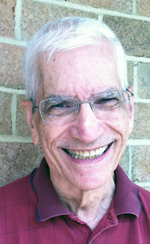By Joel H. Cohen

NEW YORK — There’s something about helping out with a minyan, especially to enable someone to say kaddish, that draws even some of the least observant among us, as does the obligation to say say kaddish itself. And, as solemn a mitzvah it is, there sometimes are humorous sidelights.
When my father died in December in the early 1960’s, the weather was particularly nasty. Among the faithful kaddish-sayers during that period was an affable young man who stood up in the midst of shacharis services one morning, and declared, “My mother wouldn’t want me out on a day like this.” Then he sat down and resumed davening and, weather notwithstanding, continued attending regularly.
Meanwhile, at my home,my oldest son, then about 5, solemnly assured me on one bitter morning: “Don’t worry, Dad, when you die, I won’t go out in weather like this. I’ll get Uncle Buddy to say kaddish for you.”
Decades later, I still chuckle about his remark.
A shul in Queens, NY my uncle attended faithfully had a large parking lot near a subway station, and the understanding was that anyone coming to shacharis services could leave his car there all day and take the conveniently located subway to Manhattan. One Monday or Thursday, it was decided to give an aliyah to a man who’d become a regular attendee. But he gratefully refused, explaining, “I’m not Jewish.” Either he loved the service, or was just content to exchange his attendance for all-day parking.
Recently in this column, there was admiring mention of a faithful band of volunteers on Staten island and beyond, who — regardless of even the most severe weather any time of year– regularly attend funerals of indigent Jewish strangers, provided by the venerable and remarkable Hebrew Free Burial Association. By attending and forming minyanim, they enabled the deceased to have a proper Jewish burial.. Many of the same volunteers regularly help out with minyanim at their shuls, as well.
The search for a minyan sometimes becomes an urgent quest, often with a pleasant result.
For instance, the young son of a man saying kaddish for a parent, surprised his father by gathering a minyan of strangers on a train heading south, for services in the baggage car. The youngster had gone from car to car, asking men whether they were Jewish, and found enough of them for the required quorum.
One Sunday during a kaddish-saying period, I just missed a minchah minyan at the El Al terminal at JFK Airport, but lucked into another at a second terminal.
My longtime “no-hitter” of observing yahrtzeits at maariv, shacharis and mincha was broken one year when I’d wrongly expected the anniversary to occur in December as usual, but it came in late November instead.. Thinking the yahrzeit would not come for some time, we’d booked a return flight from Florida for that very day. I was able to attend marariv and shacharis services in Florida and hoped I could make mincha on Staten Island after the plane landed at Newark Airport. But as luck would have it, the young neighbor picking us up had trouble finding where he’d parked his car, just long enough to miss mincha.
(Hope there’s credit for good intentions.)
Some believe that observing a yahrtzeit elevates the soul of the deceased. Yet a Jewish co-worker might have been right when he said that reciting the mourner’s prayer is more for the benefit of the mourner than his late parent. That discussion is probably best left to the sages.
As to the son who pledged not to go out in bad weather to say kaddish for me, the uncle he planned to enlist in his stead is gone. and we haven’t discussed whether that son, now in his 50s, or his siblings, will go out in inclement weather. I’ll get back to you on that.
*
Cohen is a freelance writer based in New York City. He may be contacted via joel.cohen@sdjewishworld.com